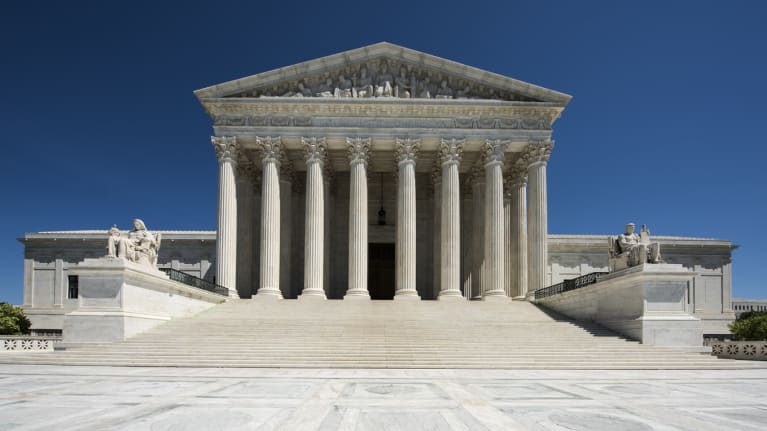

The U.S. Supreme Court in a June 24 decision upheld Mississippi’s restrictions on abortion, a ruling that may lead employers to revise their employee health care benefits.
The Dobbs v. Jackson Women’s Health Organization decision overturns the Roe v. Wade (1973) and Planned Parenthood of Southeastern Pennsylvania v. Casey (1992) decisions that preempted state restrictions on abortion.
SHRM research finds some companies may add coverage of travel expenses to obtain medical procedures, including abortions, not available nearby, or consider changes to parental leave and caregiving benefits.
No Constitutional Right to Abortion
The Mississippi Gestational Age Act provided that “except in a medical emergency or in the case of a severe fetal abnormality,” abortion is prohibited “if the probable gestational age of the unborn human being has been determined to be greater than 15 weeks.”
In an opinion joined by four justices, Justice Samuel Alito Jr. said, “We hold that Roe and Casey must be overruled. The Constitution makes no reference to abortion, and no such right is implicitly protected by any constitutional provision, including the one on which the defenders of Roe and Casey now chiefly rely—the Due Process Clause of the Fourteenth Amendment.”
He also stated that “Abortion presents a profound moral question. The Constitution does not prohibit the citizens of each State from regulating or prohibiting abortion. Roe and Casey arrogated that authority. We now overrule those decisions and return that authority to the people and their elected representatives.” The Mississippi statute was upheld.
In a concurrence, Justice Clarence Thomas joined the opinion of the court, stating, that “it correctly holds that there is no constitutional right to abortion.”
In another concurrence, Chief Justice John Roberts Jr. said he would have upheld the Mississippi statute but leave the constitutionality question for another day.
Dissent
In a dissent written by Justice Stephen Breyer and joined by two other justices, he said, “For half a century, Roe v. Wade, 410 U. S. 113 (1973), and Planned Parenthood of Southeastern Pa. v. Casey, 505 U. S. 833 (1992), have protected the liberty and equality of women. Roe held, and Casey reaffirmed, that the Constitution safeguards a woman’s right to decide for herself whether to bear a child. Roe held, and Casey reaffirmed, that in the first stages of pregnancy, the government could not make that choice for women.”
He stated, “The government could not control a woman’s body or the course of a woman’s life: It could not determine what the woman’s future would be.”
The court’s opinion discards the balance struck by Roe, according to Breyer. The court’s opinion “says that from the very moment of fertilization, a woman has no rights to speak of. A state can force her to bring a pregnancy to term, even at the steepest personal and familial costs. An abortion restriction, the majority holds, is permissible whenever rational, the lowest level of scrutiny known to the law. And because, as the court has often stated, protecting fetal life is rational, states will feel free to enact all manner of restrictions,” he predicted.
[Read the statement from the Society for Human Resource Management on the Supreme Court’s ruling]
State and Local Laws Reign Following Supreme Court’s Ruling
Many states “will prohibit or enact severe restrictions,” said Jonathan Segal, an attorney with Duane Morris in Philadelphia and New York City.
Employers across the country are grappling with what to do about Roe v. Wade being overturned, said Segal.
“It is generally recommended that employers refrain from giving definitive answers on the impact of the decision on health insurance coverage for abortions,” he explained. “With the specter of not only civil but also criminal liability under state law, coupled with the complexities of ERISA [Employee Retirement Income Security Act], it is reasonable for employers to state the employer is studying the issue and will provide more specific guidance as promptly as possible.”
Some Companies Will Cover Abortion-Related Travel Expenses
Nonetheless, “I think it will become increasingly common for employers to have some sort of health care access policies in place to help employees travel where needed to obtain medical care,” said Meredith Kirshenbaum, an attorney with Goldberg Kohn in Chicago.
Several major companies have announced that they will cover abortion-related travel expenses, including Amazon, Citigroup, Apple and Levi Strauss.
Timothy Collins, an attorney with Duane Morris in Philadelphia, cautioned, “travel expenses should be paid through the employer’s group health plan so as not to inadvertently create a new, standalone group health plan.”
He said that employers that opt to provide abortion-related travel expenses “will want to be clear in what situations travel expenses will be paid.”
For example, will such expenses be paid only for employees residing in states where abortions become unlawful? Is travel limited to the closest state that allows abortions to remain lawful? “Employers will want to think about these issues and clearly document their travel expense payment policy,” he said.
With the overturning of Roe v. Wade, states can enact restrictions on abortion access in ways that were previously prohibited, Kirshenbaum noted. Certain states have trigger laws in place, which are laws that outlaw abortion and are designed to go into effect immediately with the overturning of Roe v. Wade, she noted.
“State laws may contain restrictions on aiding and abetting abortion, and whether or not companies violate that law by helping individuals travel out of state to obtain a legal abortion is still an open question,” she said.
On the other hand, New York has enacted a law providing a right to sue a person who takes action to stop someone from having an abortion, according to Axios.
President Biden has stated “he will consider an executive order protecting the right to abortion,” Segal added. While such an order likely would be challenged, state constitutions “may protect a woman’s right to choose. The legal battle is far from over,” Segal said.
Self-insured companies are subject to ERISA, rather than state law, and have broad flexibility in structuring health benefits, noted the Society for Human Resource Management (SHRM). Fully insured health care plans are subject to state regulations and have less flexibility in benefit design.
Kirshenbaum said that employers “will need to consider where they are located, whether it is important to their workforce that they have such [travel] policies in place, and whether or not they can withstand any legal or political pushback against their policies.”
Employees Clash
It is inevitable that there will be discussion about the decision among employees, Segal said. “It is neither practical nor desirable to attempt to shut down the discussions, independent of any potential legal rights employees may have for such discussion,” he said.
Some of the conversations will become contentious, which may lead to workplace disruptions, Segal noted.
“Address the disruptions by focusing on the disruption and not the point of view. Do so even handedly,” he said. “While employers generally should avoid the content causing the disruption, there are exceptions. If employees post or make discriminatory comments, for example, about conservative Christians or Catholics, employers need to respond to them.”

